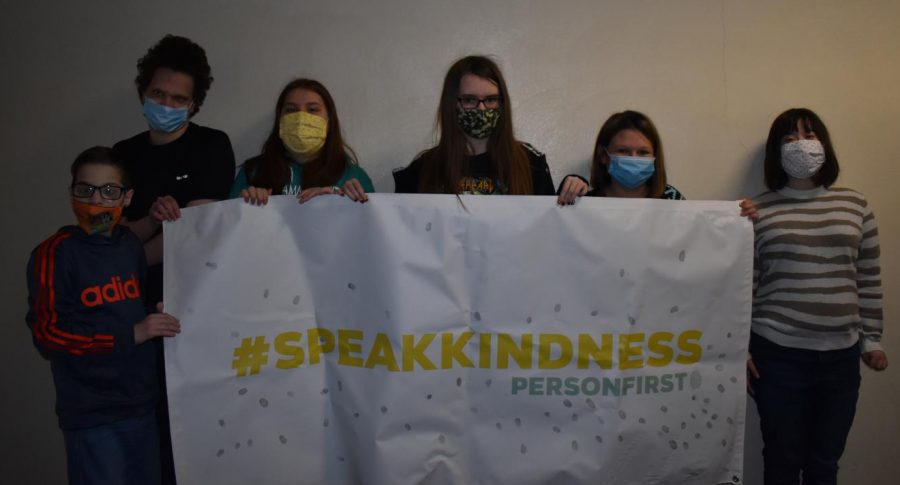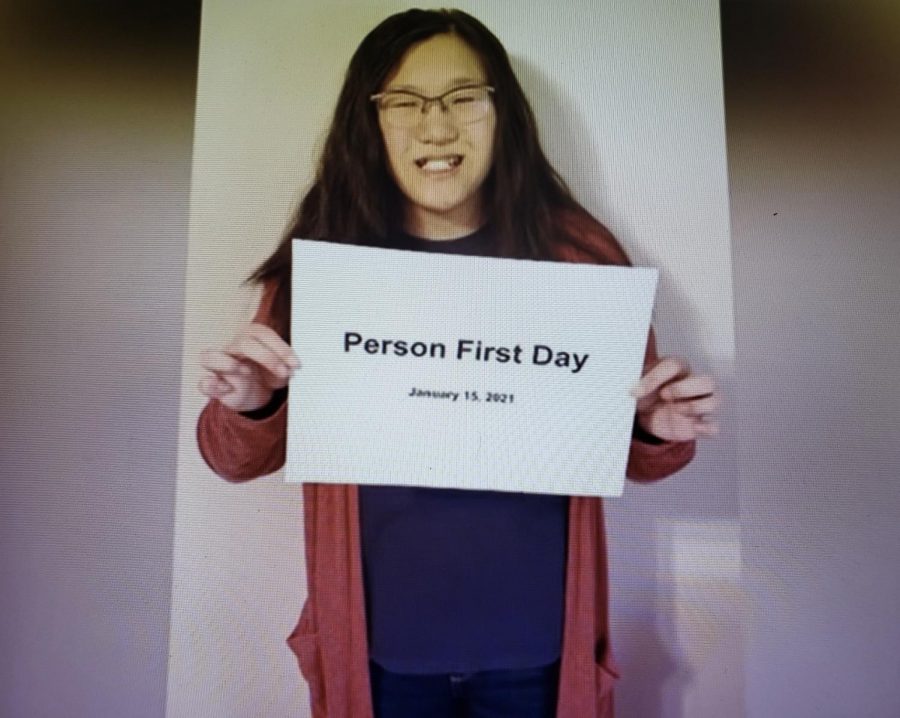OHS students pose with a banner in honor of Person First Day
Person First Day celebrated on Jan. 15
January 29, 2021
This year, OHS celebrated Person First Day, which is a formally recognized Minnesota holiday that aims to spread awareness about inclusion and respect for all. The Person First campaign encourages the use of person first language and was introduced by Special Olympics Minnesota’s (SOMN) Student Board of Directors in 2017. In addition to the celebration of Person First Day at OHS, two videos of OHS junior Annie Thurnau were shared to Facebook by special education teacher Ms. Marilyn Olson. In one video, Thurnau explains Person First Day and person first language and in the other she discusses the importance of inclusion in schools and communities. These videos garnered a lot of attention on Facebook and brought light to the importance of Person First Day and why changes are needed to improve inclusion in order to show respect and support for people who have disabilities.
Person First Day is an annual holiday celebrated statewide in Minnesota on Jan. 15. It was proclaimed in 2020 by Governor Tim Walz. In the proclamation, Gov. Walz said, “Minnesota is at the front of the Inclusion Revolution and we are committed to using person first language to promote the whole identity of individuals.” This holiday is meant to raise awareness about person first language, promote inclusion in our communities and fight ableism.
Understanding ableism
A large part of celebrating Person First Day and practicing person first language is combating ableism. Ableism is defined as discrimination against people who have disabilities. Mr. Nick Cedergren, who serves on the Unified Schools team as the Senior Manager of Unified Schools at SOMN, said, “This campaign is really combating the larger notion of ableism. Ableism is the discrimination of and social prejudice against people with disabilities based on the belief that typical abilities are superior. At its heart, ableism is rooted in the assumption that disabled people require ‘fixing’ and defines people by their disability.” Person First Day is celebrated in many Minnesota schools, including OHS. Mr. Turnar Kist, who is a special education teacher at OHS, said, “This is not just for schools, but for the general population to take a step back and reflect on how to be more inclusive in society.”
What is person first language?
A large part of celebrating Person First Day is spreading awareness about person first language, which is also known as people first language. Kist said, “Person first language puts the person before the disability. It is used to identify individuals with disabilities and ensures you recognize the disability because it is a part of who they are, but it is not all the person is.” For example, instead of referring to someone as disabled, one would refer to them as a person with a disability. This asserts that what they have is not all that they are- they are a person first. Special education teacher Ms. Marilyn Olson said, “Instead of saying that down syndrome kid, you would say little Johnny.” This example showcases putting the person first when communicating.
Why is person first language important?
Person first language is important because it helps decrease degradation of people who have disabilities, who have been historically degraded by speech through labels. Cedergren said, “Language is a powerful tool to promote inclusion and make sure everyone feels seen and heard.” By identifying people who have disabilities by their disability and not their individual selves, people facilitate prejudice and discrimination towards them and therefore do not allow themselves to see and appreciate their individuality and personality.
Other important things to consider are other people’s feelings regarding the way they are spoken to and spoken about and how one can make others feel more comfortable. Kist said, “Many people still use the “r” word or use inappropriate words to describe people with disabilities, and the easiest way to fix this is by correcting people and showing you support people with disabilities.”
Another important thing to consider is what a person’s preference is regarding person first language. Identity first language is another way for people to be identified. Using identity first language, one would say “a disabled person”, whereas with person first language, one would say “a person who has a disability.” People have preferences regarding how they are spoken to and how people speak about them, so it is important to ask. Thurnau said, “If you are not sure what someone prefers, it is best to ask them. I like person first language and when someone is speaking to me or about me, I prefer to have my name be used first like ‘My name is Annie and I have cognitive disabilities.’”
Person First Day at OHS
This year, Person First Day was celebrated at OHS on Jan. 12 and Jan. 14. Unfortunately, OHS was unable to celebrate it on its official date of Jan. 15 due to a snow day. It was celebrated with a banner in which students could place their fingerprints to show their support for inclusion in the school. Students could place their fingerprint on the banner during lunch hours. Kist said, “The purpose was to have students come show support for inclusion and to make a commitment to respect individuals with disabilities by placing a fingerprint on a banner.” This celebration was organized by Kist and Olson. Another way that somebody can show support for the use of person first language and the fight against ableism is to take this pledge.
Annie’s message
Owatonna Public Schools Facebook
OHS junior Annie Thurnau in a video posted to Facebook on Jan. 15 to advocate for Person First Day
As previously mentioned, on Person First Day this year, Olson shared two videos of Thurnau on Facebook. The first of these videos focuses on Person First Day, including why it is celebrated and more information about the use of person first language. On what Person First Day means to her, Thurnau said, “It means that I am recognized as Annie first and not my disabilities first.” In the second video, Thurnau discusses why inclusion is important and what it means to her. She also explains what ableism is and how people can combat it. In the video, Thurnau said, “Inclusion is learning alongside my peers in more general education classes with teachers who are willing to be learners too.”
On what inspired her to share these messages, Thurnau said, “Mr. Kist, Mrs. Olson and my family inspired me to share my story so that others can learn more about inclusion and share my message.” These videos have made an impact on many people and are a great way to learn about Person First Day, person first language, ableism and how students can promote inclusion in their schools and communities. On the extent of the impact of these videos, Olson said, “I think it is huge. So many people reached out for us to share. And then from there they shared and their friend shared and people who don’t even know her reached out even to Annie to share and to learn more about what person first language is.” To learn more about Person First Day and the fight against ableism, visit this website.



